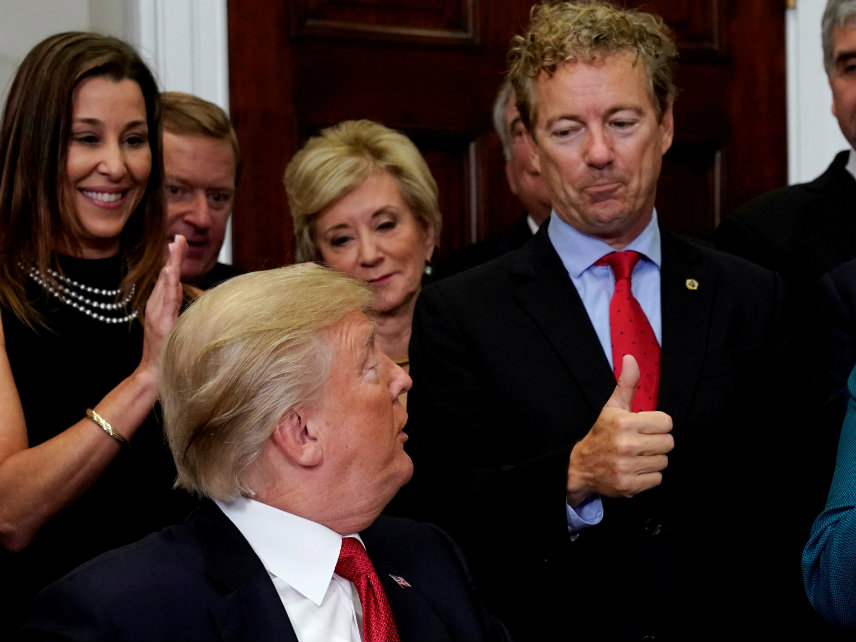Rand Paul Worries Mike Pompeo Will Keep America in Afghanistan Even Longer
"The president has been very specific, at times, on this," Paul said. "He said 'it is time to get out of Afghanistan.'"

Some senators may be worried that CIA Director Mike Pompeo, tapped by Donald Trump to be the next secretary of state, agrees with the president too much. Sen. Rand Paul (R-Ky.) says his concern is exactly the opposite.
Paul worries that Pompeo might disagree with Trump's instincts on the seemingly never-ending war in Afghanistan. The senator argues that Trump was elected in part because of his desire to end that war and his strong opposition to nation building.
"The president has been very specific, at times, on this," Paul said during Pompeo's confirmation hearing before the Senate Foreign Relations Committee today. "He said, 'It is time to get out of Afghanistan. We are building roads and bridges and schools for people who hate us. It is not in our national interest.'"
Of course, Trump being Trump, there are always other quotes that can be used to refute almost anything he has said. Pompeo parried Paul's questions by pointing out that Trump has changed his stance on Afghanistan in recent months.
"I share the president's view that we have a continued role there," Pompeo said. "We're not at a place yet where it's appropriate [to leave]."
Will we ever reach that place? "I think we won the battle," Paul said. "We did. We literally did. There is no one left alive who plotted the attacks on 9/11. We are now sending people to war who were not even born when 9/11 happened."
Paul's position on the Senate Foreign Relations Committee could be critical to Pompeo's confirmation. If the committee's 10 Democratic members oppose him, Paul would be the swing vote on the 21-member committee. A committee vote is expected later this month. A spokesman confirmed that Paul still plans to vote "no."
If the nomination makes it to the Senate floor via a different route, Republicans, with their slim 51–49 majority, could face another close vote.
Paul opposed Pompeo's appointment to run the CIA last year, saying in January 2017 that Pompeo's "desire for security will trump his defense of liberty." He was the lone GOP vote against Pompeo's appointment.
While senators on both sides of the aisle queried Pompeo about his views on the Iranian nuclear deal, the rise of China as a geopolitical force, the threat posed by North Korea, and the relationship between the U.S. and Russia, there were few direct confrontations over Pompeo's own record. Sen. Johnny Iskason (R-Ga.) ended a long non-question by inviting Pompeo to "feel free to brag about yourself." But Pompeo's record deserves serious scrutiny, because it's a record that includes support for domestic surveillance, opposition to a free press, and a call for the execution of Edward Snowden.
One of the few attempts at forcing Pompeo to explain himself was made by Sen. Tim Kaine (D-Va.), who pointed out that Pompeo had voted on multiple occasions when he was a member of the House to restrict then-President Barack Obama's ability to wage war in Libya, and elsewhere, without permission from Congress. "Now that I'm in the executive branch, my views on that have not changed," Pompeo said before pivoting to argue that "multiple presidential administrations" have engaged in limited military assaults—as the Trump administration did last year when it launched missiles at Syria, something it may be preparing to do again—without congressional authorization.
The implication was that Pompeo believes that sort of unapproved military activity is perfectly fine. "That we have done it in the past doesn't make it constitutional," Paul said, picking up on the earlier exchange between Pompeo and Kaine. "I take objection to the idea that the president can go to war where he wants, when he wants."


Show Comments (45)